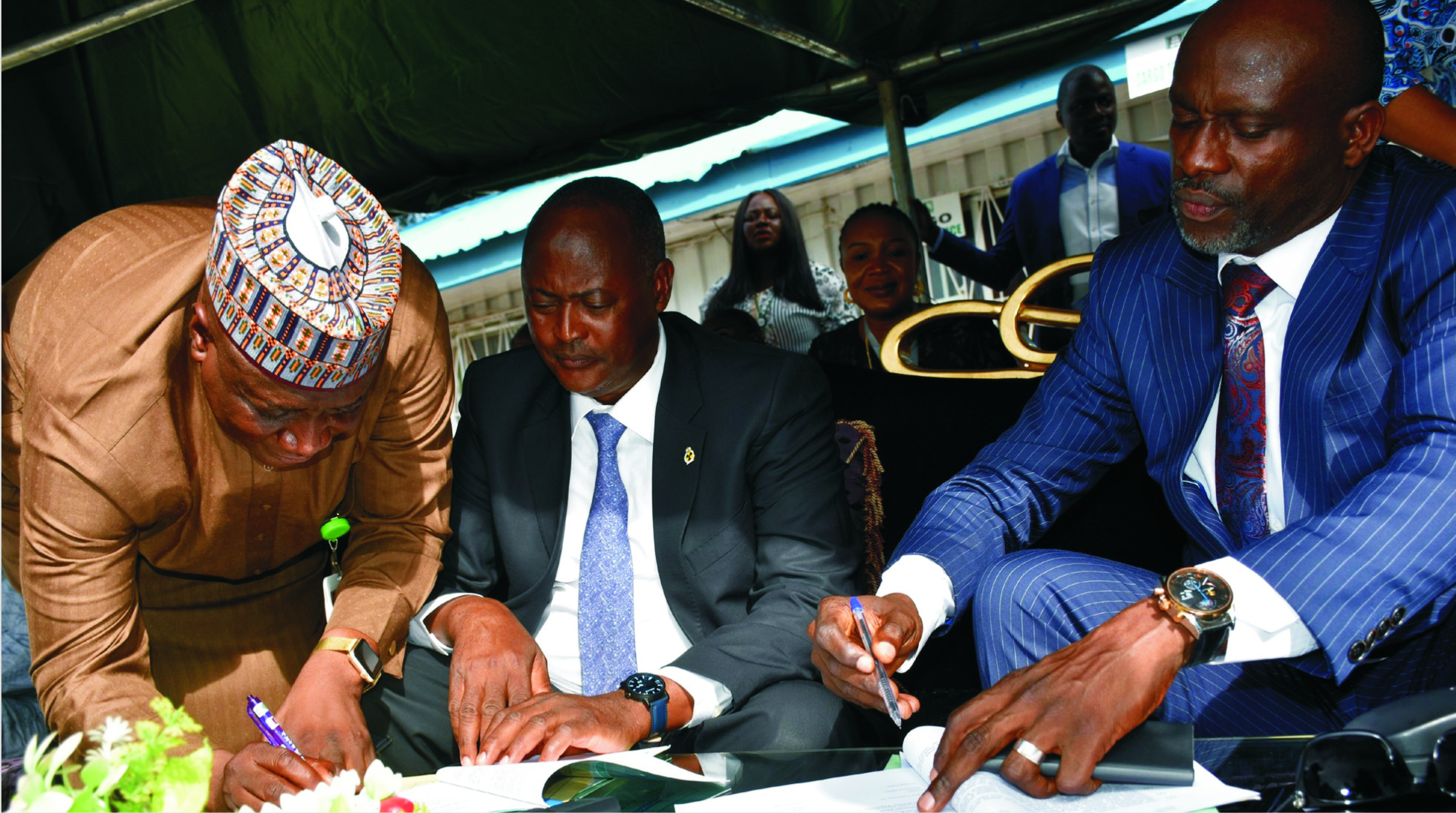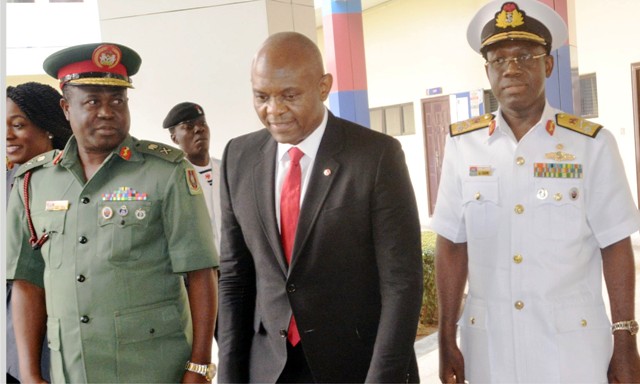Business
N25.7trn Debt: Experts Oppose IMF’s Call For Tax Hike

Finance experts have disagreed with the International Monetary Fund’s latest recommendation to the Federal Government to raise its tax rate in order to meet Nigeria’s huge amount spent on debt servicing and developmental projects.
The Federal Government spends an average of N2tn annually servicing its debt obligation to local and foreign creditors.
About $3 trillion is reportedly needed in the next 30 years to address the country’s infrastructure deficit.
But the IMF last Wednesday called for an effective debt management strategy that would ensure that the amount borrowed posed limited risk and the funds deployed for developmental purposes.
The global body said that with Nigeria having one of the lowest tax revenue in the world, it would be challenging to service its debt obligations without broadening the fiscal space.
The nation’s total public debt rose by N3.32 trillion in one year to N25.7 trillion as at the end of June 2019, the Debt Management Office said last Tuesday.
The Federal Government owed N20.42 trillion as of June 30, 2019 while the 36 states and the Federal Capital Territory had a total debt portfolio of N5.28 trillion.
Shedding more light on how the Federal Government could boost revenue, Cathy said the priority was how to increase non-oil tax revenue.
She said this was vital based on the fact that the country’s interest payments as a share of tax were very high.
She added: “On Nigeria, the priority is a comprehensive reform to increase non-oil tax and there are a number of reasons this will contribute to creating space for important spending in infrastructure and human development spending.
“For Nigeria, this is very important for a number of reasons. One, because right now, interests payment as share of tax are very high around a third of overall and two-thirds for the Federal Government.”
Responding, a Professor of Economics at the Olabisi Onabanjo University, Ago Iwoye, Sheriffdeen Tella, said the advice to raise tax had to be analysed to determine whether the IMF was asking Nigeria to increase tax or widen the tax net to accommodate those that are not currently captured.
He said: “If they are advising that we should keep increasing tax, that will not be proper. The economy of Nigeria is currently weak and tax is a function of the income of the people. Increasing tax will be putting too much pressure on income.
“We should rather talk of reschedule the existing loan to enable us to have a longer time to pay or pay less. In addition to this, we need to widen the tax net.”
On his part, the Director General of the Lagos Chamber of Commerce and Industry, Mr Muda Yusuf, pointed out that economic growth through reforms would happen if there was greater commitment to creating an enabling environment for investors.
He said the tax paying segment of the economy had been victim of regulatory and policy shocks in recent years.
”Monetary policy is tight enough in my view. Calling for more tightening will be overkill. Lending rates are high and government borrowing continues to have a crowding out effect on the private sector. We need to push back on portfolio flows as the pillar for stabilising the forex market. I subscribe to the demand for the rationalisation of the multiple forex windows and rates, he said.”
A former President, Association of National Accountants of Nigeria, Dr Sam Nzekwe, noted that many Nigerian businessmen were not paying taxes except workers, whose taxes were being deducted from their salary.
He said: “They should be proactive, go to the people and widen the tax net, they should bring those who are not paying tax into the tax net.”
The Chief Executive Officer, Enterprise Stockbrokers, Mr Rotimi Fakayejo, said the advice given by the IMF to Nigeria was not progressive because it would impair productivity of businesses.
Business
Insecurity, Poor Power Supply Hamper Business Activities – Survey

Business in Nigeria remain under pressure as a result of insecurity and erratic power supply which continue to stifle productivity in the country.
This is even as new data from the Central Bank of Nigeria (CBN) indicate sustained improvements in economic activity.
This was the response of businesses in the CBN’s October 2025 Business Expectations Survey (BES) and the Purchasing Managers’ Index (PMI) report.
While the PMI showed that economic activity expanded for the 11th consecutive month, the BES revealed that businesses are still grappling with crippling operational constraints that threaten to reverse recent macroeconomic gains.
According to the BES conducted between October 6 and 10, firms identified insecurity (71.8 points) as the most critical challenge affecting operations nationwide. This was closely followed by insufficient power supply (70.9 points), multiple taxation (70.2 points), high interest rates (68.4 points) and financial constraints (65.6 points). Analysts say these constraints underscore the depth of structural weaknesses confronting Nigeria’s private sector.
Despite these challenges, the survey reported a rise in business optimism. The Business Confidence Index increased to 38.5 points in October from 31.5 in September. Firms also projected confidence levels to reach 45.6 points in November, with expectations of further improvement over the next three to six months.
However, sector analysts warn that the optimism remains fragile due to the lack of significant improvements in the operating environment.
The BES further showed a modest rise in capacity utilisation from 60.4% in September to 62.0% in October, suggesting that businesses have yet to deploy their productive capacity amid ongoing disruptions fully.
In contrast to the structural constraints highlighted in the BES, the PMI report indicated strengthening economic momentum. The composite PMI rose to 55.4 points, reflecting expansion across major components such as output, new orders, employment, inventories, and supplier delivery times.
A sectoral breakdown showed that the agriculture sector recorded the most substantial improvement, with its PMI climbing to 57.5 points, marking 15 consecutive months of expansion. The services sector also expanded for the ninth straight month to 55.6 points, while the industry sector rose to 54.2 points, the highest in more than a year.
The CBN attributed the positive trends to improvements in the broader macroeconomic landscape, including declining inflation, which eased from 24.5% in January to 18.0% in September, and the year-to-date appreciation of the naira across both official and parallel markets.
The BES showed that the North-East posted the highest business confidence at 56.1 points, while the South-South recorded the lowest at 23.3 points, a trend linked to declining activity in oil-producing communities.
Business
FG Set To Launch Free National Financial Literacy Training For 100,000 Youths,
The Federal Government will on Tuesday, November 25, officially unveil a strategic programme for a free nationwide training of over 100,000 youth on financial literacy.
The Federal Ministry of Youth Development will launch the programme in collaboration with Investonaire Academy. Tagged, the “Financial Literacy, Investment, and Wealth Creation programme.”
The flagship initiative is designed to equip young Nigerians with essential financial skills, investment knowledge, and digital competencies for sustainable wealth creation.
A statement signed by the Director, Press and Public Relations, Federal Ministry of Youth Development, Omolara Esan, and made available to newsmen, confirmed that the launch of the programme, to be held in Abuja, would promote nationwide participation.
It added that the launch would bring together senior government officials, development partners, private sector leaders, and youth representatives to explore innovative approaches for improving financial capability and strengthening the economic prospects of young Nigerians.
Minister of Youth Development, Comrade Ayodele Olawande, would serve as the chief host, while the Minister of Women Affairs, Hajiya Imaan Sulaiman-Ibrahim, would grace the event as the Special Guest of Honour.
Also expected are representatives of key government institutions and private sector partners, including Dr Enefola Odiba, International Programme Director, Investonaire Academy, and Mr. Bashir Nurmohamed, Chief Executive Officer, Hantec Markets
The statement reads, “A major highlight of the event will be the unveiling of a free national financial literacy training programme targeting over 100,000 youths annually. The programme will be powered by a state-of-the-art Learning Management System (LMS) designed to enhance financial intelligence, investment capacity, and entrepreneurial readiness among Nigerian youth.
Lady Godknows Ogbulu
Business
‘Entrepreneurs, Not Foreign Aid Drive Nigeria’s Growth’

The chairman of the United Bank for Africa, Tony Elumelu, says Nigeria’s economic transformation will be driven by entrepreneurs, not government handouts or foreign assistance.
Elumelu, who spoke at the Grow Nigeria Conference 2.0 and themed ‘Empowering Nigeria’s Entrepreneurs: Building Institutions That Last’, in Lagos, Monday, said the nation’s future is already being shaped by business owners who refuse to settle for mediocrity.
Elumelu, who is also the founder of the Tony Elumelu Foundation, described Nigeria as an entrepreneurial nation but stressed the need to build institutions that can stand the test of time.
“Starting businesses is good. Sustaining them is critical, and that’s how we transform this economy,” he said.
He noted that many promising ideas fail because the systems and support structures necessary for growth are absent.
According to him, Nigeria’s renewal must come from the private sector, backed by strong governance frameworks and proper succession planning.
“Nigeria will not be built by government handouts or foreign aid. Government’s role is critical, but Nigeria will be built by entrepreneurs — by you, building businesses that create jobs, hope, and prosperity from the ground up,” he said.
Elumelu, however, emphasized that entrepreneurs cannot succeed in isolation.
“You need frameworks — clear governance, succession planning, and relentless focus on value. We need the right environment. We need a Nigeria where policies are predictable, infrastructure works, and financing is truly accessible,” he said.
He called for stronger alignment between public and private sector efforts, warning that progress would remain limited if institutions work independently rather than collaboratively.
Elumelu commended the Director-General of the Small and Medium Enterprises Development Agency of Nigeria (SMEDAN), Charles Odii, for ongoing reforms within the agency.
He further lauded President Bola Tinubu for appointing young Nigerians to lead key institutions and for prioritizing youth entrepreneurship.
“Let us cut the bureaucracy. Make finance and opportunity real, not theoretical. Let’s help Nigeria’s entrepreneurs move from surviving to winning.
“Every job we create fights insecurity. Every thriving business increases our tax base and accelerates prosperity for all,” Elumelu added.
-
Politics5 days ago
PDP, ADC Fault FG Over Kebbi School Attack
-
Sports5 days ago
S’Eagles Coach Accuses Congo Of Voodoo After Loss
-
Business5 days ago
2025 LITF: Lagos Promises MSMEs Continued Visibility, Capacity Building
-
Ict/Telecom5 days ago
NCC Assures Safe, Accessible Digital Space
-
Business5 days ago
‘I’ll End Casualisation If Elected As ATSSSAN President’
-
Editorial4 days ago
Resurgence Of Illegal Structures In PH
-
News5 days ago
Reps Move To Suspend 2026 WAEC’s Computer-based Exam Policy
-
Sports5 days ago
New WW Whyte Secondary Schools Cup Kicks Off In PH

